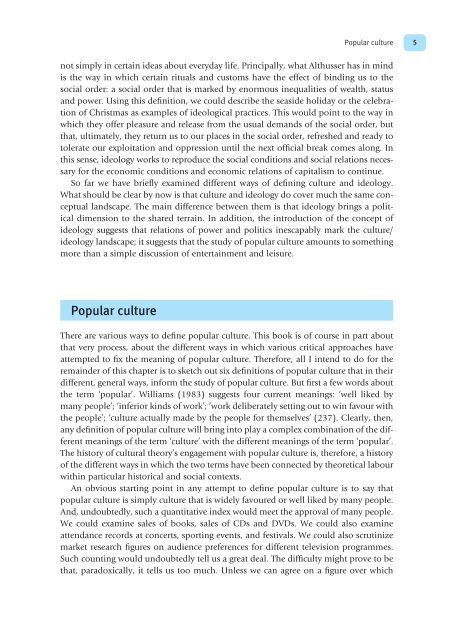Cultural Theory and Popular Culture
Cultural Theory and Popular Culture
Cultural Theory and Popular Culture
You also want an ePaper? Increase the reach of your titles
YUMPU automatically turns print PDFs into web optimized ePapers that Google loves.
not simply in certain ideas about everyday life. Principally, what Althusser has in mind<br />
is the way in which certain rituals <strong>and</strong> customs have the effect of binding us to the<br />
social order: a social order that is marked by enormous inequalities of wealth, status<br />
<strong>and</strong> power. Using this definition, we could describe the seaside holiday or the celebration<br />
of Christmas as examples of ideological practices. This would point to the way in<br />
which they offer pleasure <strong>and</strong> release from the usual dem<strong>and</strong>s of the social order, but<br />
that, ultimately, they return us to our places in the social order, refreshed <strong>and</strong> ready to<br />
tolerate our exploitation <strong>and</strong> oppression until the next official break comes along. In<br />
this sense, ideology works to reproduce the social conditions <strong>and</strong> social relations necessary<br />
for the economic conditions <strong>and</strong> economic relations of capitalism to continue.<br />
So far we have briefly examined different ways of defining culture <strong>and</strong> ideology.<br />
What should be clear by now is that culture <strong>and</strong> ideology do cover much the same conceptual<br />
l<strong>and</strong>scape. The main difference between them is that ideology brings a political<br />
dimension to the shared terrain. In addition, the introduction of the concept of<br />
ideology suggests that relations of power <strong>and</strong> politics inescapably mark the culture/<br />
ideology l<strong>and</strong>scape; it suggests that the study of popular culture amounts to something<br />
more than a simple discussion of entertainment <strong>and</strong> leisure.<br />
<strong>Popular</strong> culture<br />
<strong>Popular</strong> culture 5<br />
There are various ways to define popular culture. This book is of course in part about<br />
that very process, about the different ways in which various critical approaches have<br />
attempted to fix the meaning of popular culture. Therefore, all I intend to do for the<br />
remainder of this chapter is to sketch out six definitions of popular culture that in their<br />
different, general ways, inform the study of popular culture. But first a few words about<br />
the term ‘popular’. Williams (1983) suggests four current meanings: ‘well liked by<br />
many people’; ‘inferior kinds of work’; ‘work deliberately setting out to win favour with<br />
the people’; ‘culture actually made by the people for themselves’ (237). Clearly, then,<br />
any definition of popular culture will bring into play a complex combination of the different<br />
meanings of the term ‘culture’ with the different meanings of the term ‘popular’.<br />
The history of cultural theory’s engagement with popular culture is, therefore, a history<br />
of the different ways in which the two terms have been connected by theoretical labour<br />
within particular historical <strong>and</strong> social contexts.<br />
An obvious starting point in any attempt to define popular culture is to say that<br />
popular culture is simply culture that is widely favoured or well liked by many people.<br />
And, undoubtedly, such a quantitative index would meet the approval of many people.<br />
We could examine sales of books, sales of CDs <strong>and</strong> DVDs. We could also examine<br />
attendance records at concerts, sporting events, <strong>and</strong> festivals. We could also scrutinize<br />
market research figures on audience preferences for different television programmes.<br />
Such counting would undoubtedly tell us a great deal. The difficulty might prove to be<br />
that, paradoxically, it tells us too much. Unless we can agree on a figure over which
















